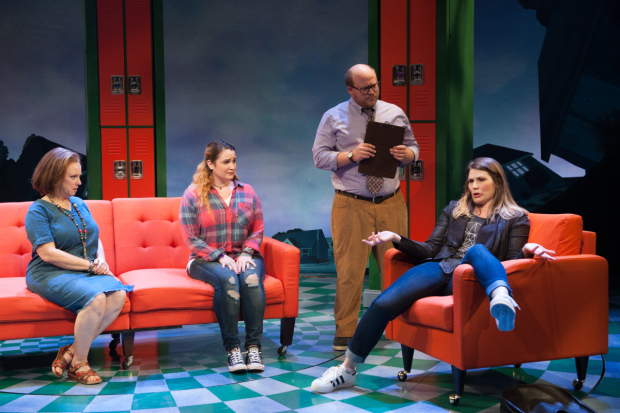
(© Margot Schulman)
Don't be surprised if the title of Signature Theatre's current production, Freaky Friday, sounds familiar. It has been around for years in different guises: First as a novel by Mary Rodgers and then as two Disney movies, in 1976 and 2003. Now, Disney and some of the most celebrated talents in the theater world have brought that story to the stage as a first-rate world premiere musical at Signature Theatre.
With a book by Bridget Carpenter, music by Tom Kitt, and lyrics by Brian Yorkey, Freaky Friday tells the story of a mother and her teenaged daughter who just don't get along on any level. The daughter, Ellie, wants to be cool and wear her hair unbrushed and unkempt. Her mother, Katherine, wants her to be well-mannered and neat, not slouching around in torn jeans. Beyond the superficial, however, are some more serious problems. Ellie is still mourning the death of her beloved father, and she's convinced that her mother wants her to be perfect. To complicate matters, Katherine is getting married the day after this play takes place, so it would be convenient if everyone could get along.
But, as fate would have it, Katherine and Ellie argue over an hourglass Katherine's husband gave them, and in the middle of the argument, the hourglass gets broken. That break leads to a weird bit of bad magic as Katherine and Ellie switch places. Ellie immediately becomes more mature, sounding exactly like her mother. Katherine transforms into a bored teenager, constantly tapping her foot as if to express eternal anxiety, winding a strand of loose hair around her index finger, and standing pigeon-toed to let everyone know how insecure she feels.
The plot of Freaky Friday is wafer thin. Apart from some funny, last-minute wedding planning and a cautionary tale to brothers and sisters about what not to say to younger siblings, the story is superficially delightful fluff. Yet right underneath the surface, there's a heartwarming lesson about a mother and a daughter who learn to see the world through each other's eyes. What it lacks in complexity, it makes up for in talent onstage.
Heidi Blickenstaff is sensational as Katherine in her dead-on imitation of a teenager. She can convincingly croon her young son to sleep, as she does in "After All of This and Everything" or belt a variety of songs after she and Ellie switch places including "I Got This," "What You Got," and "Busted."
Emma Hunton is equally strong as Ellie, whether she is showing up at a school conference ("Somebody Has Got to Take the Blame") or pretending to be the old Ellie when she is in school dissecting frogs ("Oh, Biology"). Both Blickenstaff and Hunton are capable comic actresses and handily exaggerate the absurdity of their situation, which lends an aura of farce to the show.
Alan H. Green is excellent as Katherine's fiancé, a supportive, loving man who knows nothing about Katherine's inner switch. His "Vows," a romantic number he sings to Ellie – thinking she is Katherine – sums up the awkward limits of how complicated this mistaken identity business can be. Jason Gotay is delightful as the lanky teen heartthrob whom Ellie adores and who adores Ellie's mother's sandwiches. His "Women and Sandwiches" is a comic delight.
On press night, Jake Heston Miller sang the role of Katherine's young son, Fletcher, and he was outstanding. Sherri Edelen and Bobby Smith are also solid comic choices as Katherine's mother and father. J. Elaine Marcos is appealing as Katherine's frazzled assistant and wedding planner.
Director Christopher Ashley adds contemporary touches to remind us that the action is happening in the present day. Ashley has Adam sing an entire song ("Go") while sashaying around the stage on a hover board. Choreographer Sergio Trujillo is responsible for the jazzy dance numbers that the 12-member ensemble strongly executes.
Kitt's music and Yorkey's quirky lyrics are largely responsible for the uplifting spirit of the show. Although most of the numbers are what you might expect from a contemporary rock musical, one – "Bring My Baby (Brother) Home" – is straight out of the 1950s, in terms of its beat and sound. Brian Perri conducts an impeccable orchestra of nine musicians from an invisible balcony above the stage.
Beowulf Boritt's scenic design begins with a semicircular, colorful collection of houses suggesting a community. Those houses are at times joined by images of Chicago's skyscrapers. Emily Rebholz's costumes look fittingly like clothes worn by suburban teenagers and adults.
Freaky Friday is both touching and hilarious, true-to-life despite its insistence that we suspend our disbelief while two people "swap" bodies for two hours and 10 minutes. But during that time, it shows how easily people of utterly different views can come to understand one another. And that's a lesson we can all take with us.









